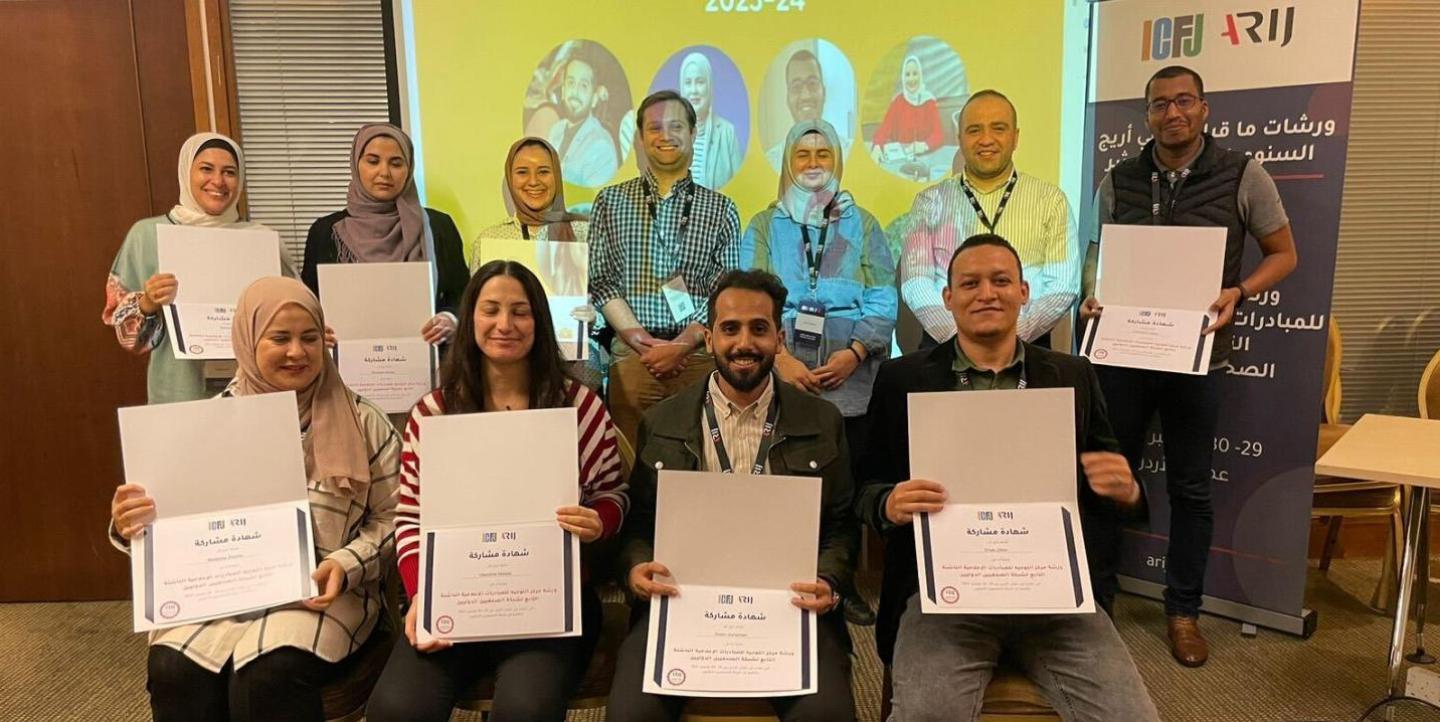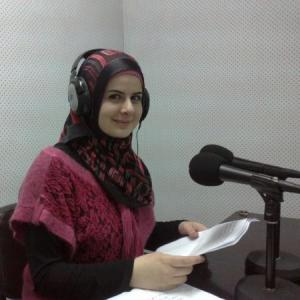Over the course of a decade, IJNet Arabic’s Mentoring Center for Media Startups has helped nearly 80 media entrepreneurs in the Middle East and North Africa develop innovative news platforms.
In the Mentoring Center’s 10th cohort this year, eight mentees dedicated time to building the sustainability of their initiatives, which focus on addressing critical issues in the region, including democracy, refugees, climate change and more.
Hailing from Algeria, Egypt, Jordan, Morocco, Lebanon, Libya and Yemen, they were paired with mentors Ahmed Esmat, executive director of the Alexandria Media Form, and Ramsey Tesdell, executive director of Arabic podcasting platform Sowt, to receive hands-on guidance, which involved weekly calls, long-term assignments, and an in-person training in Amman, Jordan alongside the Arab Reporters for Investigative Journalism (ARIJ) Annual Forum.
Here’s how this year’s mentees fared over the past year:
Rahma Diaa, Egypt
Rahma Diaa built out her platform, “Climate School,” which offers climate journalism training to Arabic-speaking journalists.
"The initiative developed a lot. Our team has increased to about 20 volunteers now,” said Diaa. “We formed about 10 new partnerships with regional and local organizations during the program. About 600 journalists from 20 Middle Eastern and North African countries participated in 16 training sessions that we arranged.”
Diaa said the Mentoring Center taught her the importance of collaboration, and she built partnerships with several of her fellow participants and their initiatives.
"I created, with Laha Podcast, an audio guide with do’s and don’ts of environmental reporting, and worked with She Checks to launch the “Her Climate” media campaign,” said Diaa, referring to an effort to raise awareness of the effects of climate change on women through social media. “I also organized a joint [training] session before COP28, with Shabab House.”
With a grant from the Center, Diaa ran a separate training session for journalists on humanitarian storytelling around impacts of climate change on women.
Valentine Nesser, Lebanon
Valentine Nesser manages Silat Wassel, which publishes content focused on feminism and youth issues in southern Lebanon.
During the program, Nesser developed a content strategy, formed partnerships with other Mentoring Center initiatives, and attracted funds to support her work.
“[Prior to the Mentoring Center, my initiative was] in its early stages and lacked clear guidance and strategic planning,” said Nesser. “Thanks to the guidance during the program, I managed to improve my project's goals, set a comprehensive strategy for creating and distributing content, and form partnerships.”
Nesser also organized a workshop in southern Lebanon on information access, training sessions on data journalism, and a webinar series with the Google News Initiative on combating mis- and disinformation, digital safety for journalists, and more.
“I acquired valuable insights into audience engagement and user experience, allowing me to improve my platform's reach and effect. Through networking during the program, I managed to secure funding opportunities,” Nesser explained.
Assem al-Shameri, Yemen
Assem al-Shameri runs the Shabab House Foundation for Media and Cultural Development, which reports on social issues in Yemen.
"During the program, I worked on internal matters within the organization. We contacted donors as the program provided an opportunity to coordinate with them. I also established partnerships with [fellow mentees at] Silat Wassel and She Checks," al-Shameri said.
With a grant from the program, Shabab House launched its “Political Awareness for Peace” project, a series of six videos about U.N. Resolution 2250, which encourages youth participation in global peace efforts to combat the spread of violent extremism.
Ehab Zidan, Egypt
Ehab Zidan’s outlet, al-Mohajer, is an interactive platform that specializes in refugee and migrant issues in the Middle East and North Africa.
Al-Mohajer’s content included news for and about refugees, as well as data-driven investigations on refugee-related issues. “We launched newsletters dedicated to jobs and opportunities for refugees and asylum seekers in Egypt, as well as a psychological support newsletter specifically for refugees and children fleeing conflict and war zones,” Zidan said.
During the Mentoring Center, Zidan created social media marketing plans, enhanced funding sources and collaborated with regional and international media outlets to produce stories about immigration and asylum issues.
With a grant from the program, al-Mohajer reported stories about the challenges faced by refugees, displaced people, and asylum seekers in Yemen, Jordan, Egypt and Sudan.
Lahcen Chuis, Morocco
Lahcen Chuis runs Dialogue for Democracy, a platform that reports on issues of public interest in Morocco.
During the Mentoring Center, Chuis diversified Dialogue for Democracy’s social media presence and funding sources, and was accepted into a training program with DW Akademie.
He partnered with civil society organizations to jointly implement media programs, and Dialogue for Democracy also organized a series of discussions with young people in Morocco around human rights and the rule of law.
“The program enhanced skills and opened new horizons for media entrepreneurs through providing guidance, training, funding, and building networks,” he said.
Ruwaida Fallag, Libya
Ruwaida Fallag is the founder of She Checks, which specializes in combating AI-generated disinformation and fact-checking content for a target audience of mothers in Libya and the wider Maghreb region.
During her participation in the Mentoring Center, Fallag said she developed workflows to enhance her team’s productivity, and formed key partnerships with regional and international fact-checking organizations.
With a grant from the program, Fallag launched a project under She Checks to combat disinformation using Instagram Reels. “Our team produced the first guide for fact-checking via smartphones, under the supervision of mentor Ramsey Tesdell,” she said.
Raghad Gharaibeh, Jordan
Jordanian journalist Raghad Gharaibeh runs the Jordanian Youth Dialogue platform to engage young audiences on human rights.
Through the Mentoring Center, Gharaibeh developed a strategic business model to guide her outlet’s work and form partnerships.
"I began putting the mentor's advice into practice by conducting market analysis and targeting the appropriate audience,” Gharaibeh said, adding that the program helped improve her outlet’s financial independence and sustainability.
Gharaibeh utilized a grant from the Mentoring Center to fund a project to promote positive change through solutions journalism in Jordan. She collaborated with journalists and producers to create a series of videos about solutions reporting, its impact on society, and expert tips for creating stories using this approach.
Madgeda Zouine, Algeria
Madgeda Zouine is a co-founder of Laha Podcast, an initiative that produces podcasts and videos focused on women’s issues and rights.
During the Mentoring Center, Zouine improved her digital marketing strategies and identified content areas of high interest to women listeners. This helped her grow Laha’s audience.
“My participation in the program gave me an opportunity to collaborate with women organizations and platforms. I enhanced the digital presence [on Facebook and am also] planning to establish a new website for Laha Podcast,” she explained.
With a grant from the program, she launched a project called “Feminism and Digital Content in Algeria,” which involved publishing a series of videos and a podcast focused on enhancing the representation of women online.
Networking during the program also helped her form partnerships with Climate School and Le Journal Féministe Algérien.


